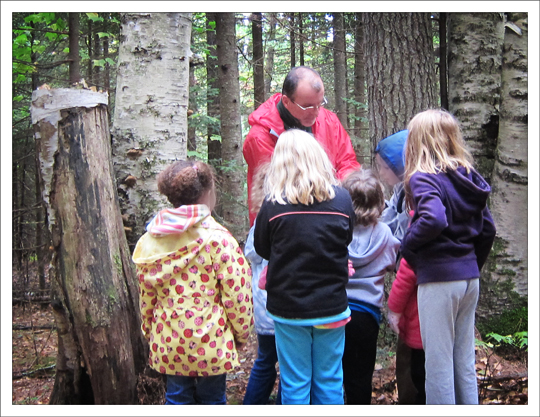VIC Educational Programs
 The Paul Smitihs VIC offers educational field trips to area school children at no cost to the schools.
The Paul Smitihs VIC offers educational field trips to area school children at no cost to the schools.
The Paul Smiths VIC is committed to promoting a closer connection between children and nature. To that end, the VIC offers a variety of educational programs designed to teach area school children about the natural world and give them a positive outdoor learning experience at the VIC. Area school teachers are encouraged to contact Brian McDonnell for more information.
No School Day Programs: The VIC provides day-long sessions for children ages 6-10, who become VIC eco-explorers, going on hikes, exploring the marsh, playing games, and making arts and crafts. The program is offered on days during the school year when school is not in session, including spring vacation, when a full week of outside activities is offered, with a different theme for each day.
Little
Bobcats: The Little Bobcat program is meant to introduce
preschool age children to the wonders of nature. Through activities
that also involve parents, children have a chance to encounter
the local flora and fauna of the Adirondacks. Weekly themed
projects include a short lesson and art project for 3-5 year
olds and their parents. Topics include dragonflies, bluebirds,
wildflowers, and monarchs! The program is offered on Thursdays
during the winter. During the summer, the program is offered
Saturdays at 10 AM in July and August.
Nature Classroom for Schools
The
Paul Smiths VIC also offers excellent educational opportunities
for school classes. VIC naturalists and volunteers lead an array
of programs for pre-K through high school. The VIC's educational
programs are aligned with NYS Learning Standards.
Individual Activity Combinations: Schools may choose
from selections of the different VIC programs. This allows schools
to create their own program for a VIC visit. With this option,
teachers are welcome to focus field trips on whichever activities
best compliment their classroom curriculum. Each program is
about an hour; and schools may choose up to three. These programs
include:
-
Habitat Walk (K-4th): Students are taken on a hike through the 3 main habitats on the VIC property: wetland, hardwood forest, and conifer forest. The group stops at each habitat site and make observations, discussing what animals would live there and why.
-
Nature Scavenger Hunt (K-4th): Students work alone or in pairs to find natural items on the VIC property. Items are discussed and then replaced.
-
Habitat Building (K-4th): How do animals survive in the woods? How do people survive in the woods? Students work in groups to build natural shelters while discussing what is needed for a good habitat.
-
Natural vs. Unnatural (2nd-6th): Everyone uses natural things in their daily lives. Students discuss where products come from and where they go and look for some "unnatural" items in the forest.
Full day activities: The VIC also offers full day long programs. These explore a single theme for the duration of a trip, allowing students to study specific subjects in more depth. These programs include:
-
Use Your Senses (K-4th): In the first half of the day, students go on a naturalist-led hike using the five senses (with the exception of taste, which is reserved for lunch). The second portion of the day is spent in activities and games that challenge people to adapt. The group also discusses animal adaptations.
-
EcoExplorers: A closer look at the Adirondack Ecosystem (2nd-5th): The Adirondacks are like a large jigsaw puzzle. Each piece of the puzzle works together to create a wonderful working system. One part of the day is spent discussing the different parts of an ecosystem, the water cycle, energy cycle and why they are important to human survival. During the second part of the day, participants see firsthand these systems working out on the trail.
-
Marsh Madness (3rd-12th): Wetlands are an integral piece of the ecosystem puzzle. The first portion of the day is spent exploring what a wetland is, the water cycle and what type of animals live in a marsh. The second half of the program involves taking samples from the marsh. For older groups, this involves measuring the pH of the wetland and talking about acid rain; younger groups measure the pH and sample species found.
-
Salamander Study (4th-12th): In this program, students explore the topics of forest ecology, silviculture, and indicator organisms. Participants do field research to help the VIC staff discover the health of our forests. For groups of 25 or less.
